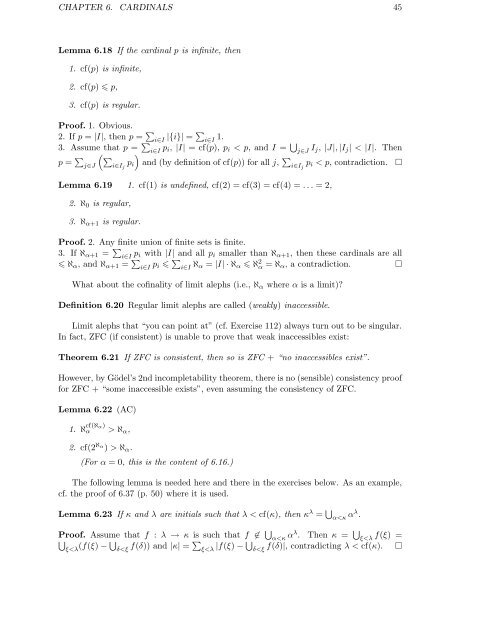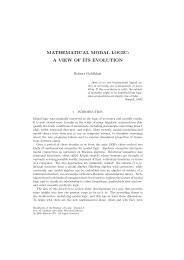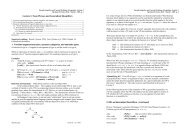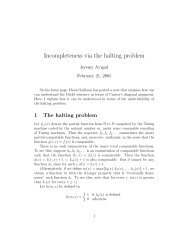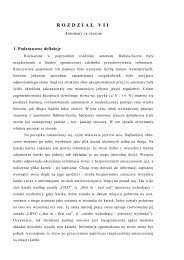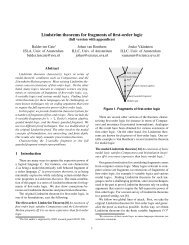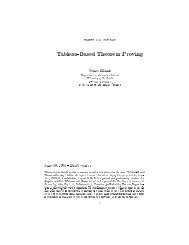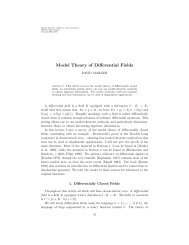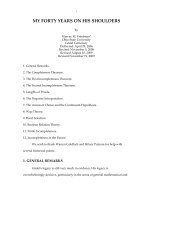Zermelo-Fraenkel Set Theory
Zermelo-Fraenkel Set Theory
Zermelo-Fraenkel Set Theory
You also want an ePaper? Increase the reach of your titles
YUMPU automatically turns print PDFs into web optimized ePapers that Google loves.
CHAPTER 6. CARDINALS 45<br />
Lemma 6.18 If the cardinal p is infinite, then<br />
1. cf(p) is infinite,<br />
2. cf(p) p,<br />
3. cf(p) is regular.<br />
Proof. 1. Obvious.<br />
2. If p = |I|, then p = ∑ i∈I |{i}| = ∑ i∈I 1.<br />
3. Assume that p = ∑ i∈I p i, |I| = cf(p), p i < p, and I = ⋃ j∈J I j, |J|, |I j | < |I|. Then<br />
p = ∑ ( ∑ )<br />
j∈J i∈I j<br />
p i and (by definition of cf(p)) for all j, ∑ i∈I j<br />
p i < p, contradiction. □<br />
Lemma 6.19 1. cf(1) is undefined, cf(2) = cf(3) = cf(4) = . . . = 2,<br />
2. ℵ 0 is regular,<br />
3. ℵ α+1 is regular.<br />
Proof. 2. Any finite union of finite sets is finite.<br />
3. If ℵ α+1 = ∑ i∈I p i with |I| and all p i smaller than ℵ α+1 , then these cardinals are all<br />
ℵ α , and ℵ α+1 = ∑ i∈I p i ∑ i∈I ℵ α = |I| · ℵ α ℵ 2 α = ℵ α , a contradiction.<br />
□<br />
What about the cofinality of limit alephs (i.e., ℵ α where α is a limit)?<br />
Definition 6.20 Regular limit alephs are called (weakly) inaccessible.<br />
Limit alephs that “you can point at” (cf. Exercise 112) always turn out to be singular.<br />
In fact, ZFC (if consistent) is unable to prove that weak inaccessibles exist:<br />
Theorem 6.21 If ZFC is consistent, then so is ZFC + “no inaccessibles exist”.<br />
However, by Gödel’s 2nd incompletability theorem, there is no (sensible) consistency proof<br />
for ZFC + “some inaccessible exists”, even assuming the consistency of ZFC.<br />
Lemma 6.22 (AC)<br />
1. ℵ cf(ℵα)<br />
α > ℵ α ,<br />
2. cf(2 ℵα ) > ℵ α .<br />
(For α = 0, this is the content of 6.16.)<br />
The following lemma is needed here and there in the exercises below. As an example,<br />
cf. the proof of 6.37 (p. 50) where it is used.<br />
Lemma 6.23 If κ and λ are initials such that λ < cf(κ), then κ λ = ⋃ α


